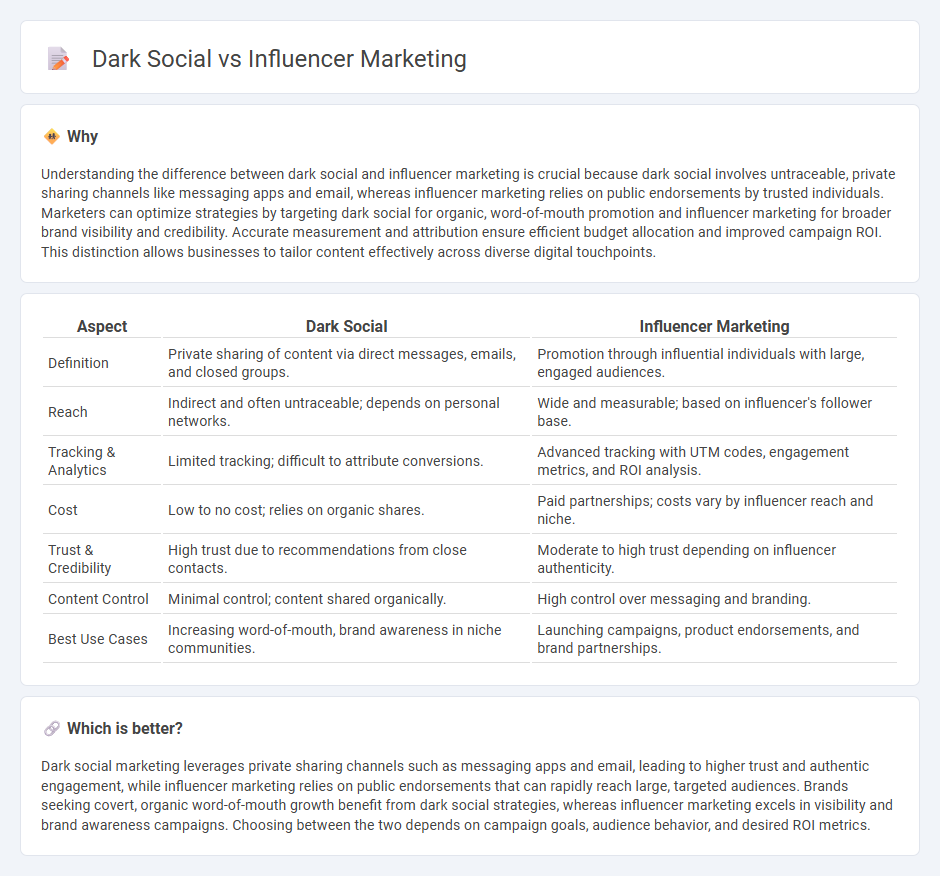
Dark social channels, including private messaging apps and email, drive significant yet often untracked traffic and engagement, making measurement and attribution challenging for marketers. Influencer marketing leverages trusted personalities across social media platforms to amplify brand reach and build authentic connections with target audiences. Explore how integrating dark social insights and influencer strategies can elevate your marketing effectiveness.
Why it is important
Understanding the difference between dark social and influencer marketing is crucial because dark social involves untraceable, private sharing channels like messaging apps and email, whereas influencer marketing relies on public endorsements by trusted individuals. Marketers can optimize strategies by targeting dark social for organic, word-of-mouth promotion and influencer marketing for broader brand visibility and credibility. Accurate measurement and attribution ensure efficient budget allocation and improved campaign ROI. This distinction allows businesses to tailor content effectively across diverse digital touchpoints.
Comparison Table
| Aspect | Dark Social | Influencer Marketing |
|---|---|---|
| Definition | Private sharing of content via direct messages, emails, and closed groups. | Promotion through influential individuals with large, engaged audiences. |
| Reach | Indirect and often untraceable; depends on personal networks. | Wide and measurable; based on influencer's follower base. |
| Tracking & Analytics | Limited tracking; difficult to attribute conversions. | Advanced tracking with UTM codes, engagement metrics, and ROI analysis. |
| Cost | Low to no cost; relies on organic shares. | Paid partnerships; costs vary by influencer reach and niche. |
| Trust & Credibility | High trust due to recommendations from close contacts. | Moderate to high trust depending on influencer authenticity. |
| Content Control | Minimal control; content shared organically. | High control over messaging and branding. |
| Best Use Cases | Increasing word-of-mouth, brand awareness in niche communities. | Launching campaigns, product endorsements, and brand partnerships. |
Which is better?
Dark social marketing leverages private sharing channels such as messaging apps and email, leading to higher trust and authentic engagement, while influencer marketing relies on public endorsements that can rapidly reach large, targeted audiences. Brands seeking covert, organic word-of-mouth growth benefit from dark social strategies, whereas influencer marketing excels in visibility and brand awareness campaigns. Choosing between the two depends on campaign goals, audience behavior, and desired ROI metrics.
Connection
Dark social channels, including private messaging apps and email, play a crucial role in influencer marketing by enabling authentic peer-to-peer sharing of branded content, which often goes untracked by traditional analytics. Influencers amplify brand messages within these private networks, fostering trust and driving organic engagement through word-of-mouth referrals. Understanding the intersection of dark social and influencer marketing helps brands optimize campaign strategies and accurately measure social ROI despite the challenges of attribution.
Key Terms
**Influencer Marketing:**
Influencer marketing leverages social media personalities to promote products, driving brand awareness and consumer trust through authentic engagement. Key performance indicators include reach, engagement rate, and conversion metrics, making it a measurable strategy for targeted audience impact. Explore how influencer marketing can amplify your brand's presence in competitive markets.
Brand Ambassadors
Brand ambassadors leverage influencer marketing by authentically promoting products within their trusted networks, boosting brand credibility and engagement. Dark social channels, such as private messaging and closed groups, amplify these endorsements through discreet, word-of-mouth sharing that escapes traditional analytics. Explore how integrating brand ambassadors with dark social strategies can maximize your marketing impact.
Sponsored Content
Sponsored content in influencer marketing leverages trusted personalities to amplify brand messages across social networks, enhancing reach and engagement through authentic storytelling. Dark social channels, including private messaging apps and encrypted platforms, obscure content sharing data, making it challenging for marketers to track the impact of sponsored posts accurately. Explore how integrating influencer strategies with dark social insights can optimize your sponsored content campaigns for maximum ROI.
Source and External Links
Influencer marketing - Wikipedia - Influencer marketing is a social media marketing strategy where brands collaborate with influencers--individuals with expertise or social influence--to endorse products or services on platforms like Instagram, YouTube, or TikTok, aiming to affect consumer behavior and build brand credibility.
What Is Influencer Marketing? - Mailchimp - Influencer marketing involves partnering with individuals who have followings aligned with your target audience to increase brand exposure by setting clear goals, targeting the right audience, and managing budgets to optimize campaign effectiveness.
Influencer Marketing: All You Need to Know to Plan, Execute, and ... - Influencer marketing hinges on collaborating with trusted social media personalities to expand brand reach and trust, requiring strategic planning, influencer selection, and tailored content across platforms to ensure good ROI and business growth.
 dowidth.com
dowidth.com